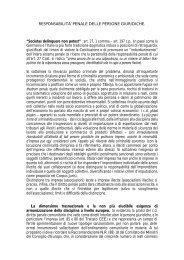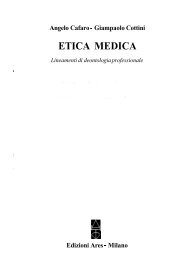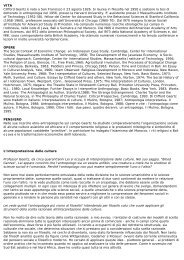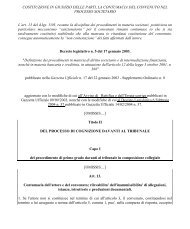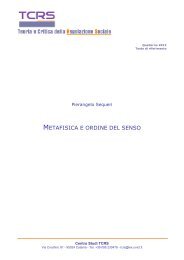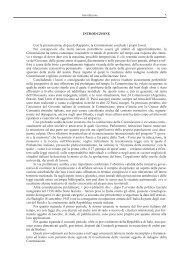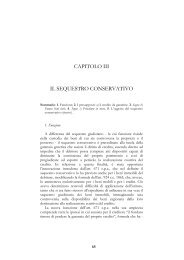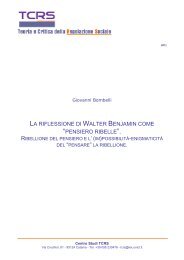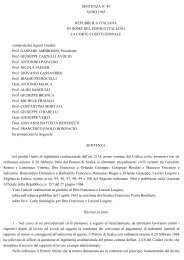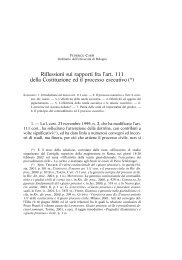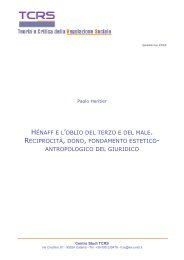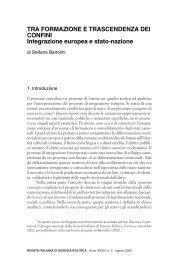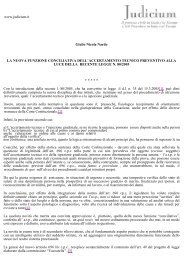FOGLI DI LAVORO per il Diritto internazionale 3 ... - Giurisprudenza
FOGLI DI LAVORO per il Diritto internazionale 3 ... - Giurisprudenza
FOGLI DI LAVORO per il Diritto internazionale 3 ... - Giurisprudenza
Create successful ePaper yourself
Turn your PDF publications into a flip-book with our unique Google optimized e-Paper software.
<strong>FOGLI</strong> <strong>DI</strong> <strong>LAVORO</strong> <strong>per</strong> <strong>il</strong> <strong>Diritto</strong> <strong>internazionale</strong> 3/2008<br />
38. In the Government's view, Article 6 § 1 of the<br />
Convention was not applicable in the present case, as the dispute<br />
did not refer to “civ<strong>il</strong> rights and obligations” within the meaning<br />
of that Article. According to the Government, the subject of the<br />
proceedings, namely the alleged violation of the applicant<br />
associations' freedom of religion by certain governmental<br />
statements, did not concern the violation of asset rights, but of<br />
legal interests of a non-pecuniary nature. Neither did the result<br />
of the impugned proceedings constitute a necessary prerequisite<br />
for bringing an action for damages against the Government<br />
before the civ<strong>il</strong> courts.<br />
39. The Government further maintained that the contested<br />
warnings issued by the Government had no direct effect on or<br />
substantive consequences for the applicant associations' legal<br />
position under civ<strong>il</strong> law. Although it could not be ruled out that<br />
individual citizens may have been motivated by the<br />
Government's warnings to distance themselves from the<br />
applicant associations, it was impossible to determine whether<br />
this actually occurred and whether it had any financial<br />
consequences for the applicant associations. In any event, any<br />
such consequences could not be considered as immediate. The<br />
mere fact that the warnings may possibly have had financial<br />
consequences for the applicant associations was not sufficient to<br />
bring the proceedings within the scope of Article 6 § 1.<br />
40. Neither could the applicab<strong>il</strong>ity of Article 6 § 1 of the<br />
Convention be derived from the Court's case-law, according to<br />
which the right to a good reputation was a “civ<strong>il</strong> right” within<br />
the meaning of that provision. Firstly, the applicant associations<br />
did not assert the right to a good reputation or to <strong>per</strong>sonal<br />
honour under domestic law before the domestic courts, but only<br />
their right to the freedom to profess and practise a religion<br />
undisturbed without state interference. Secondly, the right to<br />
protect good reputation and <strong>per</strong>sonal honour could only be<br />
accorded to individual <strong>per</strong>sons, but not to groups of <strong>per</strong>sons<br />
such as the applicant associations.<br />
2. The remaining applicant associations' submissions<br />
41. The applicant associations contested those arguments.<br />
They considered that their right to freedom of religion had to be<br />
regarded as a “civ<strong>il</strong> right” within the meaning of Article 6 § 1.<br />
187



